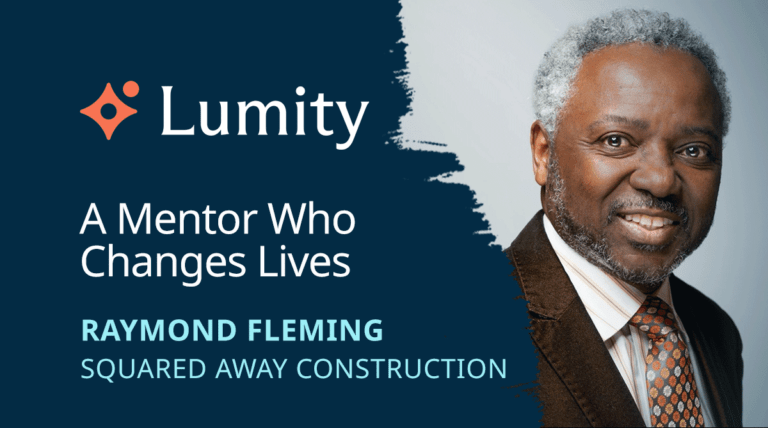Lumity’s work is designed to change the future for the young people who enroll in our programs. Our mission centers on exposing them to careers in STEM and teaching them the skills they need to succeed. Central to making this happen is people like Raymond Fleming. Raymond is the owner of Squared Away Construction. He’s also an expert trainer in the construction industry and the driving force behind some of our most impactful programs.
Raymond works one-on-one with our trainees. He has spent decades working with youth to lift them up, provide mentorship, and help them find a better path. A true lifelong learner and a self-described “it takes a village man,” Raymond is one of the stars at Lumity who inspires our youth. We sat down with Raymond for a conversation about his work and his passion for making a difference. Excerpts from that conversation are below.
Tell me a little about your personal history and how you got involved with Lumity
I grew up on the west side of Chicago and graduated from Providence St. Mel’s. I went to Valparaiso University and then served four years in the United States Navy. I’ve always believed you’ve gotta give back, so I started working at the Illinois Department of Human Services. I also worked in alternative schools and at night in group homes. These experiences really gave me a sense of direction about which population I wanted to work with. What became my thing was working with harder young people with challenges.
The question for me has always been “How do I change their mindset?” Programs like YouthBuild give me the opportunity to do that. When Lumity started its own YouthBuild program, I helped them develop it. We’ve been working together ever since to recruit more young people and expand our reach.
What advice do you give the young people you’re mentoring?
A lot of them will tell me they want to make a change in their life. So I’ll ask them questions like “What’s your plan?” and “What’s the effort you need in order to make that change?” Which leads to a conversation about what effort is. And effort means showing up when you’re supposed to be somewhere and putting in the work. If you’ve got an anger management problem, effort may also mean recognizing and admitting that—and doing something to fix it.
One of the things they hear from me a lot is this: “If you can’t change your friends, you need to change your friends.” What do I mean by that? When folks see someone start doing well, they may not like that. And if that’s the case, you have to look at who you’re hanging around with. Because if you want to make a positive change in your life and you can’t get your friends on the same page, then you need to get a new set of friends who ARE on the same page. If you don’t, you’re going to end up back in trouble.
Another thing I do is make sure they know how to talk on the phone because a lot of them don’t really know how to do this. And if you’re calling someone about a job, you need to have this basic skill. So I tell them to call me, but I don’t answer my phone. So they have to leave me a voicemail message. And they begin to understand that you need to know how to communicate with others without that text lingo they use with their friends.
I don’t expect all of these young people to know what their plan for the future is. I tell them, “It’s okay if you don’t know, but it’s not okay to hang out in the street.”
What are your goals for the future?
Every day I’m working with these trainees, I just want to be the best possible role model I can be. I want to continue to add to what we offer in Lumity’s programs. We make our young people more employable when we equip them with a wider range of skills. We now do flagger and forklift training. We do HAZWOPER (Hazardous Waste Operation Emergency Response) certification. We’re teaching energy sustainability skills and how to install solar panels. We’re now adding drone training. Each of these skills opens a new door for them and helps pave the way to a good job.
Not all of them will go into construction. But by equipping them with these marketable skills, we give them a leg up. Some will enroll in college – and they can earn a lot more money painting houses during college breaks than they can working a minimum-wage job.
